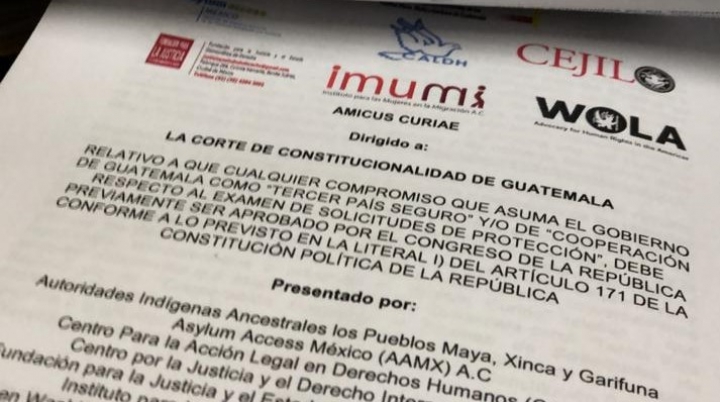COMUNICADOS
Before the Constitutional Court: Immigration Agreement with the United States must first be approved by the Guatemalan Congress
Guatemala City and San José, September 5, 2019.- In response to the signing of the migration agreement between Guatemala and the United States (US), human rights organizations submitted a technical brief to the Constitutional Court, arguing that any commitment of this nature must be previously approved by the Congress of the Republic, and maintaining that the agreement would seriously violate the human rights of people in need of international protection.
On July 26, the governments of Guatemala and the United States signed a migration agreement concerning applications for international protection. Although its scope is still being unveiled, if this agreement enters into force it would restrict access to the asylum procedure in the United States through the transfer of asylum seekers to Guatemala.
In their brief, the Indigenous Ancestral Authorities the Maya, Xinca and Garifuna Peoples, Asylum Access Mexico (AAMX), the Center for Legal Action on Human Rights (CALDH), the Center for Justice and International Law (CEJIL), the Foundation for Justice and the Democratic Rule of Law (FJEDD), the Institute for Women in Migration (IMUMI) and the Washington Office on Latin America (WOLA) argue that the agreement violates Guatemala’s commitments to guarantee the human rights of migrants contained in the Political Constitution of the Republic and the international treaties to which Guatemala is a party.
Specifically, these groups maintain that Guatemala lacks the material and legal conditions to become a “Safe Third Country” and/or to engage in “Cooperation Regarding the Examination of Applications for Protection”. This lack of conditions is in itself a clear risk for Guatemala’s fulfillment of its international obligations and will certainly affect the respect for the human rights of all persons seeking international protection in the United States.
Likewise, and consistent with the preliminary injunction of the Constitutional Court prior to the signing of the agreement, the organizations recall that the President of the Republic of Guatemala cannot decide to convert Guatemalan national territory into a “safe third country” until such a decision complies with the provisions of the Political Constitution of the Republic of Guatemala, according to which it must have the prior approval of Congress.
The organizations also indicate that the signing of agreements of this nature cannot undermine international obligations derived from conventional law or those norms that are considered mandatory under international human rights and humanitarian law, such as the principle of equality and non-discrimination; the prohibition of expulsion and return (“non refoulement”); and access to social assistance, health care, work and education, among others.
Finally, they argue that the negotiations and the agreement itself evidence that it was produced in an environment of threats and pressures that would render it null and void in accordance with the provisions of Article 52 of the Vienna Convention on the Right to Treaties.
In light of the arguments set forth in the brief, the organizations demand that the Constitutional Court issue a resolution confirming its injunction with respect to any international commitment regarding the designation of Guatemala as a “Safe Third Country” and/or relating to “Cooperation regarding the Examination of Applications for Protection” which must be previously approved by the Congress of the Republic in accordance with the provisions of paragraph l) of Article 171 of the Political Constitution of the Republic and which cannot contravene the obligations of the State under international law.
They also call on the international community to stand with the Guatemalan people in order to avoid an irreparable crisis affecting the enjoyment of human rights by Guatemalan and foreign nationals as a result of the legal and material unviability of any agreement of this nature that may be signed with Guatemala.
